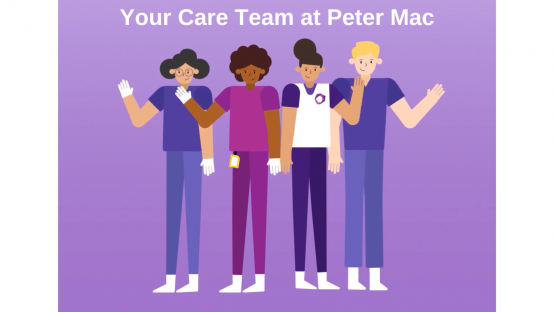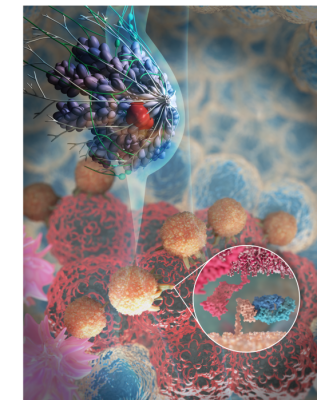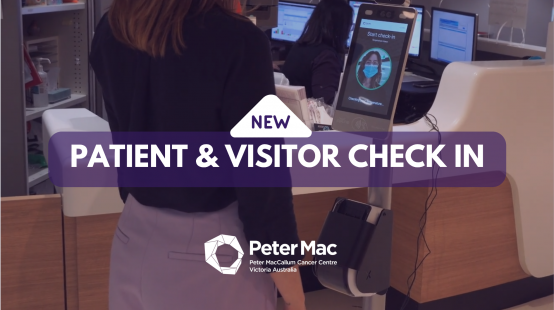
- Details
- Written by: Naomi Harrison
- Category: News
- Hits: 183
The Cancer Nursing Discovery Program is a comprehensive professional development program supporting Registered Nurses to transition into an acute oncology setting, and/or further build and consolidate foundational cancer nursing skills over a 12-month period.

During the program, participants will have the opportunity to work alongside a multidisciplinary team of world class cancer experts, caring for patients’ through-out the treatment trajectory, from diagnosis, through to treatment, supportive care, survivorship and palliative care.
Eligibility criteria:
Division One Registered Nurses with 12 months experience in an acute care setting upon completion of a graduate year (Grade 2 Year 3 and above), and ability to work a rotating roster at a minimum of 64 hours/8 shifts per fortnight. Ongoing employment will be offered upon successful completion of the program.
Clinical Rotations:
The program includes two six-month rotations on Peter Mac’s inpatient Haematology (5A), Medical (3A) or Surgical Oncology (6A) wards.
Ward 3A: 32 bed ward with a clinical focus on people who have been diagnosed with lung, head and neck, bone, soft tissue sarcoma, neurological, skin and melanoma cancers, paediatric inpatients and those receiving radionuclide therapies. Treatment modalities provided to patients on Ward 3A include: chemotherapy, symptom management and palliative care, external beam radiotherapy, adolescent care and nuclear medicine treatments.
Ward 5A: 32 bed ward with a clinical focus on people diagnosed with haematological malignancies and breast cancers. People with haematological malignancies including myeloma, lymphoma, myeloproliferative and myelodysplastic diseases and chronic leukaemia as well as patients undergoing haematopoietic stem cell transplant and CAR T-cell therapy are treated on Ward 5A.
Ward 6A: 32 bed ward with a clinical focus on people receiving surgery following a cancer diagnosis. This includes people who have been diagnosed with gastrointestinal, hepatobiliary, urological, prostate, gynaecological, breast, head and neck, melanoma and sarcoma. Treatment modalities and services on Ward 6A include: surgery, high dose radiotherapy and seed implants for prostate cancer, external beam radiotherapy, robotic assisted surgery and stomal therapy.
Education and Support:
Nurses participating in the Cancer Nursing Discovery Program receive tailored support from a dedicated team with the aim of advancing your career, both professionally and personally, in a caring and nurturing environment.
Education and support includes four additional study days above the Nurses Award entitlement, a dedicated clinical support nurse, structured competency assessments and small group education and reflection sessions tailored to the clinical areas.
Application Process:
The next intake of the Cancer Nursing Discovery Program will commence on Tuesday 16th May, 2023. For more information, please register for our online information evening being held on Wednesday 8th March, 2023.
To apply, see Cancer Nursing Discovery Program.
Contact us:
For enquiries regarding the Cancer Nursing Discovery Program, contact:
Louise Wilks, Cancer Nursing Discovery Program Coordinator
Phone: (03) 8559 5674
Email:

- Details
- Written by: Naomi Harrison
- Category: News
- Hits: 76
Peter Mac has launched a series of new video resources to help patients and visitors navigate their way Peter Mac and better understand the services available to our patients.

Associate Professor Caroline Owen said the videos, developed by students at Swinburne University, are designed to help patients navigate their cancer experience.
“We know how challenging it can be for patients and their families when they come to hospital for treatment for the first time,” Caroline said.
“Eight videos are now available on the Peter Mac website covering a range of different topics from how to get to our Parkville campus to information about staying in hospital as an inpatient and services like Radiation Therapy.
“The new resources have been developed to give patients important information about topics like where to go when they come to Peter Mac, what to bring and what to expect when they’re preparing for their appointment.
“The videos have been created by Motion Design students at the Swinburn University of Technology and we’re very grateful for the amazing job they have done,” she said.
Associate Professor Owen said this is the second time Peter Mac and Swinburne Uni students have collaborated to design information for patients.
“The students at Swinburne have previously created videos to explain what happens when patients have an appointment in specialist clinics or radiation therapy as well as the support available through our Wellbeing Centre and Youth Cancer Centre,” she said.
“These new videos available it will hopefully give everyone a better understanding of how things work at Peter Mac and help to make the experience of being a patient that little bit easier.
“We also have a PDF booklet ‘Finding your way around Peter Mac Melbourne’ on the Peter Mac website to outline which services are found on the different floors of our Parkville campus,” she said.
Links to the videos below can be found here:
- Advance Care Planning: Patient Information
- Day Therapy: Patient Introduction
- Inpatient Room: Patient Introduction
- Inpatient Room: Introduction to the meal ordering system
- Radiation Therapy: Patient Introduction
- Specialist Clinics: Patient Introduction
- Wayfinding: Getting to Peter Mac Melbourne
- Wayfinding: Floor details in the Melbourne building

- Details
- Written by: Naomi Harrison
- Category: News
- Hits: 208
Researchers at Peter Mac have uncovered that specialised T-cells, part of the immune defence against cancer, that are present in the breast tissue of patients with triple negative breast cancer can help activate the body’s immune system to fight against the cancer.

Dr Balaji Virassamy, PhD Student in a laboratory dedicated to finding new therapeutic approaches to breast cancer, said the finding was incredibly important from an immunotherapeutic point of view.
“Previously our research demonstrated that specialised T-cells, called CD8+ resident T cells, could adapt to live in breast cancers and in breast tissue. These T cells were different to those circulating in blood and were responsible for killing tumour cells in patients with triple negative breast cancer,” Dr Virassamy said.
“Our new finding uncovered that these CD8+ resident T cells are critical in determining how well the breast cancer will respond to immunotherapy treatment. The more CD8+ resident T cells found in the tissue the more likely the breast cancer is to respond to immunotherapy treatment.”
The research also uncovered that checkpoint inhibitors which work by recruiting our own immune system to kill cancer, expand the number of these CD8+ resident T cells so they are more effective in killing breast cancer.
Professor Sherene Loi, Medical Oncologist in the Breast Cancer Service and head of Translational Breast Cancer Genomics and Therapeutics Lab, said the finding would help guide new clinical research to understand how to help triple negative breast cancer patients respond better to checkpoint inhibitor treatment.
“Importantly the research also indicated that after checkpoint inhibitor treatment these CD8+ resident T cells continue to patrol the local environment and could spread into the circulation to continue to protect the body from breast cancer recurrence in the future,” she said.
Triple negative breast cancer accounts for 15 percent of early breast cancers and is the most aggressive of breast cancer types. Chemotherapy combined with immunotherapy is standard treatment for these patients.
The new paper “Intratumoral CD8+ T cells with a tissue-resident memory phenotype mediate local immunity and immune checkpoint responses in breast cancer” is available online now and will be published in Cancer Cell March 14th.
Image created by Dr Maja Divjak, Biomedical Animator at Peter Mac.
Contacts:
For more information contact the Peter Mac Communications team on 0417 123 048.
About Peter Mac
Peter MacCallum Cancer Centre is a world-leading cancer research, education and treatment centre and Australia’s only public health service solely dedicated to caring for people affected by cancer.

- Details
- Written by: Naomi Harrison
- Category: News
- Hits: 90
Last night we launched the SPLICE exhibition - an art program for young people who have experienced cancer to develop skills and prepare for pathways into further education and work.

Art Teacher Mia Schoen (far right in photo) has taken the participants on an incredible journey and the results are absolutely stunning.
This year is extra special thanks to the very kind support of Collins Place who provided a gallery space which was expertly curated by Bruce Copland.
The exhibition will be on until the end of the month (just next to the Sofitel Hotel) - make sure you check it out.
A massive thanks to Anna Gilkison, from Peter Mac's Adolescent & Young Adult Cancer Service, (far left in photo) for all her hard work in bringing the exhibition to life and supporting all of our young patients.
We would like to thank all those who support the program, including Centre for Adult Education, Koala Kids Foundation, Box Hill Institute, Learn Local, Royal Children's Hospital and the Victorian Government.
A truly collaborative effort that has given so much to our patients.
Watch a video from the launch

- Details
- Written by: Naomi Harrison
- Category: News
- Hits: 85
We are making changes to the way we screen people coming onsite at Peter Mac.

From Tuesday 14 February, a new system will be in place that allows patients, visitors, carers and others to answer screening questions and have their temperature taken by a device similar to an iPad.
Director, Patient Access and Flow, Demi Diaz, said the change is designed to make this process faster while still ensuring we can manage the risk of infection for our patients, visitors and staff, particularly our immunocompromised patients.
“This new system replaces the Department of Health’s questionnaire and makes the check-in process more automated,” Demi said.
“All patients, visitors and carers will be able to access the new devices in the main foyer at Peter Mac in Parkville. Contractors and suppliers will also be required to check-in via the new system.
“There is no longer the need for patients, visitors and others to scan a QR code on arrival and we hope the new screens will get everyone moving more quickly.
“Visitors and patients to our sites are reminded to always wear a mask, maintain social distancing of 1.5 metres where possible and to follow the instructions of staff at all times,” she said.
Multiple language options are available for Culturally and Linguistically Diverse patients and visitors to complete the check-in process and concierge staff will be on hand at our Parkville, Box Hill and Sunshine campuses over the coming weeks to guide patients and visitors through the new system.
More information about visiting Peter Mac is available on our website.
